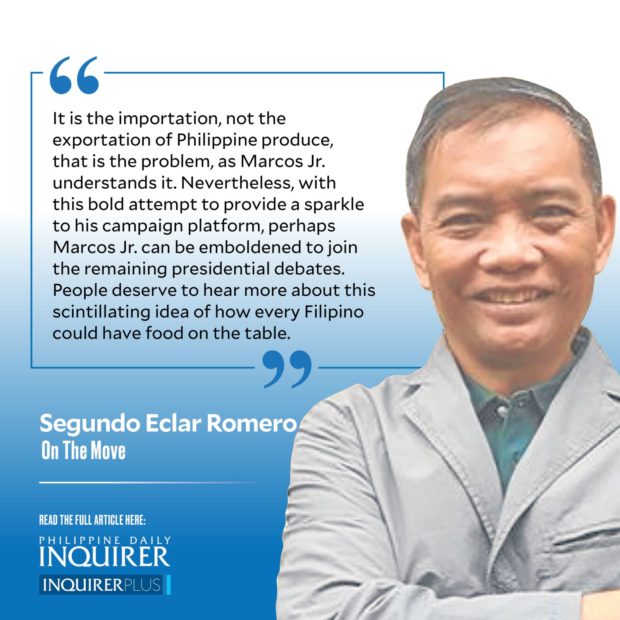A double-edged sword for Marcos Jr.
This week, the major dailies reported that Bongbong Marcos Jr. and running mate Sara Duterte are “crafting an agricultural blueprint that will ensure every Filipino family will have food on the table.”
Marcos Jr. said that the agriculture sector is key to food sufficiency, explaining that the government’s program to eradicate poverty and hunger had been too “import-centric” and should shift to “production-centric in which food requirements will be free from the dictates of market forces.”
I had to stifle a guffaw because this reminded me of another solon in the 1960s who, the story goes, threatened to file a bill in Congress to amend the law of supply and demand. Except for that last phrase, however, Marcos Jr. is right on target.
The term that his advisers have found for Marcos Jr. as a campaign battle cry for this initiative is “food sovereignty.” This is a concept of inclusive development that has a specific meaning: “Food sovereignty is a food system in which the people who produce, distribute, and consume food also control the mechanisms and policies of food production and distribution. This stands in contrast to the present corporate food regime, in which corporations and market institutions control the global food system.” (Wikipedia.)
Michel Pimbert gives a more nuanced view: “Food sovereignty is perhaps best understood as a process that seeks to expand the realm of democracy and regenerate a diversity of locally autonomous food systems. It is a transformative process in which fundamental change is a central issue for the individuals and organizations involved. It involves a deep awareness of alternative worldviews and the possibility of doing things differently. As such, it is a shift in consciousness and represents a transformative kind of learning.”
Food sovereignty is akin to internal sovereignty—it is about where control for food within the economy and society should lie. What Marcos Jr. understands by the concept is external sovereignty when he explains it: “If we are able to strengthen our agricultural sector, we will have food sufficiency and food security. And if we already have adequate food production, we will now be the ones to dictate when to export our food production, which is when we can say we have attained food sovereignty.”
In the Philippine context, food sovereignty properly refers to the empowerment of small farmers as against middlemen, corporate investors, manufacturers, and distributors. The external food sovereignty problem—the Philippines vs. other countries—exists, in the form of the excessive importation of highly subsidized produce from developed countries. However, it is the importation, not the exportation of Philippine produce, that is the problem, as Marcos Jr. understands it.
Nevertheless, with this bold attempt to provide a sparkle to his campaign platform, perhaps Marcos Jr. can be emboldened to join the remaining presidential debates. People deserve to hear more about this scintillating idea of how every Filipino could have food on the table. I will be all ears, even if Marcos Sr., ruling for 21 years with power assist from martial law, ended up impoverishing the people, not uplifting them.
If Marcos Jr. should join the debates, I recommend that he and his advisers review webinars on food sufficiency and food security and brief him well. Only last week, I hosted a webinar on “Vanishing Farmlands, Vanishing Farmers: Is the Philippines Facing a Food Crisis?” (https://bit.ly/3CPgt24). The resource person was Dr. Teodoro C. Mendoza, an expert on crop science from the University of the Philippines Los Baños.
Dr. Mendoza touched on many key topics—how the COVID-19 pandemic and now the Ukraine war heighten our food insecurity. The other factors are the oil-based food system, financialization of food, control of food production and distribution by corporate firms, use of agri-crops for biofuel, globalization, liberalization, and import of heavily subsidized food from developed countries. These factors, he said, are on top of those mentioned by agriculture experts—reduction in the arable land, lack of investment in agriculture, post-harvest loss and waste, natural disasters and transboundary diseases, stagnant productivity, and lack of water, climate change.
Coming up with “food sovereignty” is a sharp double-edged sword. Now Marcos Jr. will have to educate the voters about it. But first, he will have to be educated by his advisers and handlers.
—————-
doyromero@gmail.com





















